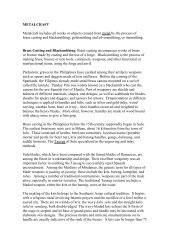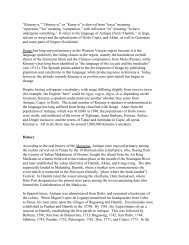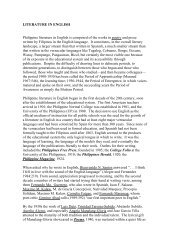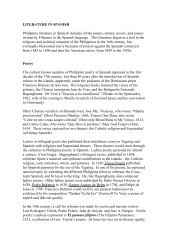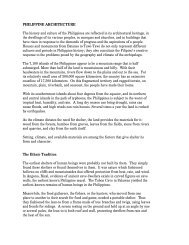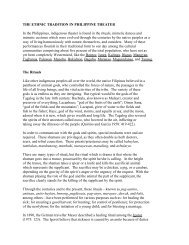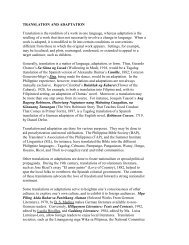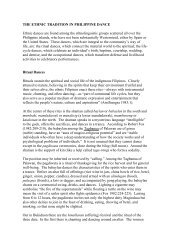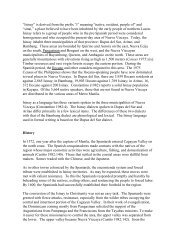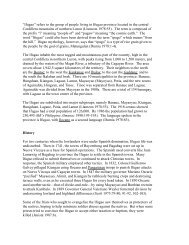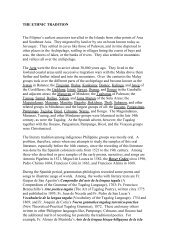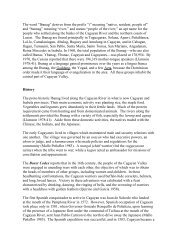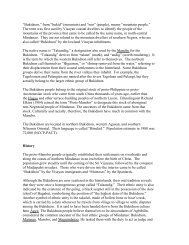The Tboli, also known as T'boli, Tiboli, and Tagabili, are an old ...
The Tboli, also known as T'boli, Tiboli, and Tagabili, are an old ...
The Tboli, also known as T'boli, Tiboli, and Tagabili, are an old ...
Create successful ePaper yourself
Turn your PDF publications into a flip-book with our unique Google optimized e-Paper software.
abortion for various re<strong>as</strong>ons, such <strong>as</strong>: her husb<strong><strong>an</strong>d</strong> h<strong>as</strong> ab<strong><strong>an</strong>d</strong>oned her <strong><strong>an</strong>d</strong> refuses to<br />
give support; she h<strong>as</strong> more children th<strong>an</strong> c<strong>an</strong> be fed adequately; her honor h<strong>as</strong> been<br />
stained; she merely w<strong>an</strong>ts to be sp<strong>are</strong>d the difficulties of delivery. <strong>The</strong> wom<strong>an</strong> goes<br />
to the tao matunga or abortionist who gives her concoctions. Failure of the latter<br />
usually results in dr<strong>as</strong>tic me<strong>as</strong>ures such <strong>as</strong> mutilation or walking around with heavy<br />
stones tied to the womb. <strong>The</strong> extreme abortion technique is suicide.<br />
<strong>The</strong> moment the mother-to-be experiences labor pains, a monkey’s intestines <strong>are</strong><br />
placed on her abdomen in the belief that this will e<strong>as</strong>e childbirth, because monkeys<br />
always have e<strong>as</strong>y deliveries. <strong>The</strong> husb<strong><strong>an</strong>d</strong> <strong>as</strong>sists the midwives during his wife’s<br />
delivery, <strong><strong>an</strong>d</strong> he places personal items, like his tok (sword) or kafil<strong>an</strong> (long knife) by<br />
her side <strong>as</strong> desu or offering to the gods in supplication for e<strong>as</strong>y childbirth. Another<br />
tok is used to cut the baby’s umbilical cord. This tok h<strong>as</strong> a mystic life-bond with the<br />
child <strong><strong>an</strong>d</strong> must never be lost, lest the child die.<br />
<strong>The</strong> mother wraps the child in her luwek or tube skirt <strong><strong>an</strong>d</strong> allows no dressing to be<br />
applied on the newly severed umbilical cord. Henceforth, she resumes her normal<br />
routine, free from the lii (taboos) that governed her pregn<strong>an</strong>cy. <strong>The</strong> child is allowed<br />
to remain naked until it decides to emulate its elders <strong><strong>an</strong>d</strong> dresses accordingly.<br />
<strong>The</strong> child is usually given a name according to its physical characteristics at birth,<br />
such <strong>as</strong> bukay (white or light-skinned), udi (small), or bong (big). Sometimes, the<br />
child is named after import<strong>an</strong>t <strong>an</strong>cestors, forces of nature, or <strong>an</strong>imals. If the child is a<br />
first-born, the p<strong>are</strong>nts <strong>are</strong> identified by the child’s name. Thus, the p<strong>are</strong>nts of a child<br />
named Fok come to be <strong>known</strong> <strong>as</strong> Ma’Fok (Father of Fok) <strong><strong>an</strong>d</strong> Ye’Fok (Mother of Fok).<br />
Disrespect or disobedience to p<strong>are</strong>nts may result in the child being bartered, a<br />
practice <strong>known</strong> <strong>as</strong> habalo. Destitute p<strong>are</strong>nts may <strong>also</strong> resort to this to meet their<br />
credit obligations. Filial obligation, however, dictates that the relatives of the p<strong>are</strong>nts<br />
buy the child themselves, or buy back the latter should he/she be s<strong>old</strong> to a non-relative.<br />
Once s<strong>old</strong>, the child ce<strong>as</strong>es to have all relations with the original family.<br />
<strong>Tboli</strong> upbringing is not strict. <strong>The</strong> indoctrination of the child into the rigid rules of<br />
<strong>Tboli</strong> society is subliminally <strong><strong>an</strong>d</strong> relentlessly pursued through the numerous folktales<br />
<strong><strong>an</strong>d</strong> beliefs that <strong>are</strong> t<strong>old</strong> <strong><strong>an</strong>d</strong> ret<strong>old</strong>. <strong>The</strong>se didactic exercises contain various lii. Among<br />
the beliefs expressed <strong>are</strong> a whole cl<strong>as</strong>s of injunctions against eating: bedak or l<strong>an</strong>gka<br />
growing against the br<strong>an</strong>ch, so that the children will not grow up to be rebellious <strong><strong>an</strong>d</strong><br />
insubordinate; the head of a pig, to prevent hardheadedness; frogs’ heads, to prevent<br />
talkativeness; burnt rice sticking at the pot bottom, to prevent laziness <strong><strong>an</strong>d</strong> unruliness;<br />
chicken wings, <strong>as</strong> the boys will be unable to build a house <strong><strong>an</strong>d</strong> the girls unable to<br />
weave; <strong><strong>an</strong>d</strong> rats, so that the children will not grow up to be thieves.<br />
Succession is exclusively reserved for men. When the father dies, his responsibilities<br />
<strong><strong>an</strong>d</strong> rights go to his eldest son or, if he h<strong>as</strong> no son, to his eldest brother. Daughters <strong>are</strong><br />
generally considered inferior to the sons <strong><strong>an</strong>d</strong> do not inherit property.



